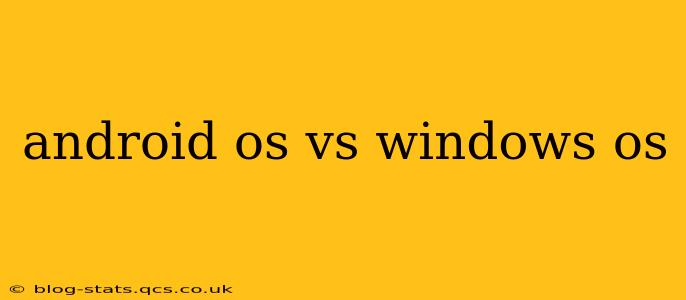The mobile and desktop computing worlds are dominated by two major operating systems: Android and Windows. While both manage hardware and software, their approaches, target devices, and user experiences differ significantly. This comprehensive comparison will delve into the key distinctions, helping you understand which OS best suits your needs.
What is Android?
Android, developed by Google, is an open-source operating system primarily used on mobile devices like smartphones and tablets. Its open-source nature allows for extensive customization and modification by manufacturers, leading to a wide array of device options. Android's flexibility and vast app ecosystem, powered by the Google Play Store, have made it the most popular mobile OS globally.
What is Windows?
Windows, developed by Microsoft, is a proprietary operating system primarily used on desktop computers, laptops, and increasingly, tablets. Known for its user-friendly interface (though evolving!), Windows dominates the desktop market, offering a robust platform for productivity, gaming, and multimedia applications. Its extensive software compatibility and strong enterprise support contribute to its enduring popularity.
Key Differences Between Android and Windows:
Here's a breakdown of the core differences between these two operating systems:
1. Device Focus:
- Android: Primarily mobile devices (smartphones, tablets, some smart TVs).
- Windows: Primarily desktop computers (laptops, desktops, some tablets). While Windows on ARM exists for mobile devices, it hasn't achieved the same widespread adoption as Android.
2. Open Source vs. Proprietary:
- Android: Open-source, allowing manufacturers and developers to modify and customize the OS. This leads to significant device diversity.
- Windows: Proprietary, meaning Microsoft controls its development and licensing. This results in more standardized experiences across devices, but less flexibility for modification.
3. User Interface and Experience:
- Android: Known for its customizable home screens, widgets, and generally intuitive touch-based interface. The design has evolved over the years, becoming more consistent across devices with the introduction of Material Design.
- Windows: Traditionally reliant on a mouse and keyboard, Windows emphasizes window management, multitasking, and desktop applications. Touchscreen functionality is increasingly integrated, but the core experience remains desktop-oriented.
4. App Ecosystems:
- Android: The Google Play Store boasts a massive library of apps, catering to a diverse range of needs. However, app quality can vary.
- Windows: The Microsoft Store offers a growing selection of apps, particularly in productivity and gaming. However, it's smaller than the Google Play Store, and many popular applications are still primarily available on the web or through desktop installers.
5. Cost and Licensing:
- Android: Generally free for manufacturers to license and integrate into their devices.
- Windows: Requires licensing fees for manufacturers to use on their devices, leading to higher costs for devices.
6. Security:
- Android: Security updates are often handled differently depending on the manufacturer and device. This can lead to inconsistencies in security patching across devices.
- Windows: Microsoft offers regular security updates across supported versions of the OS.
7. Hardware Requirements:
- Android: Relatively low hardware requirements, making it suitable for a wider range of devices.
- Windows: Typically requires more powerful hardware, especially for newer versions and demanding applications.
Frequently Asked Questions (PAA):
Is Android better than Windows?
The "better" OS depends entirely on your needs and priorities. Android excels in mobile convenience and customization, while Windows dominates in desktop productivity and software compatibility. There's no single winner.
Which OS is more secure, Android or Windows?
Both Android and Windows face security challenges. Windows generally receives more consistent security updates from Microsoft, while Android's security updates vary significantly based on device manufacturer and model.
Can I run Android apps on Windows?
While not directly, you can use Android emulators on Windows to run Android apps. This may affect performance.
Can I run Windows apps on Android?
No, you cannot directly run Windows applications on Android.
Which OS is best for gaming?
For PC gaming, Windows is overwhelmingly dominant. Android offers mobile gaming, but the hardware capabilities and available titles differ significantly.
Which OS is better for productivity?
For desktop productivity, Windows remains the leader due to its extensive software ecosystem and established workflows. Android offers productivity apps, but it's less comprehensive for tasks requiring complex software.
This comparison provides a starting point. The best operating system for you depends heavily on your individual needs and preferred device type. Consider the points above to make an informed decision.
